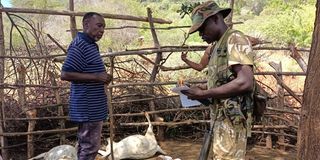Herders drive cattle into Tsavo park as drought worsens

A KWS officer David Mutisya (in uniform) takes details of Simon Mwamburi following the killing of his goats by lions that invaded his livestock shed at Kirutai village in Taita Taveta County. Mr Mwamburi lost 16 goats and two cows.
Herders in some parts of Taita Taveta have continued to drive their livestock into the Tsavo National Park to mitigate the death of their animals.
Despite the government's stand to decline the plea by residents to be allowed to graze their livestock inside the protected area, some herders still sneak into the park in search of water and pasture.
On Tuesday, over 500 heads of cattle belonging to the Maasai community in Taveta were seized by the Kenya Wildlife Service, after they were found grazing illegally in Tsavo West National Park.
The residents who were enraged by the move blocked the Voi-Taveta highway and it took the intervention of Taveta MP John Bwire to calm the situation and negotiate for the release of the cattle.
An elder in the Mata area, Reuben Ole Tiges said most parts of the county have been affected severely, following a prolonged drought last year and failed short rains.
Mr Ole Tiges said the pastoralists in the area have lost over 4,000 cows due to a lack of pasture and water and called on the government to intervene to avert the situation that has caused losses to them.
"Sometimes we sneak our cattle into the park to graze. The problem is that if we are arrested we are slapped with heavy fines," he said.
He said if allowed to graze in the park, the Maasai community will not harm wildlife since they have been living in harmony.
"As we speak, herds of elephants are roaming around our villages. We have never harmed them because we are not poachers and we don't consume game meat," he said.
Apart from herders from the county, some from other regions especially the North Eastern have illegally invaded the park.
The herders who bring their livestock for fattening before exporting them to lucrative overseas markets in the Middle East have now found grazing areas inside the Tsavo West National Park.
Recently, leaders led by Governor Andrew Mwadime and conservation officials in Taita Taveta accused KWS of shielding the herders but arresting those from the county.
The leaders said the government through KWS must rescind its decision to mitigate the death of their animals.
MP Bwire said next week they will present a public petition to compel the Cabinet Secretary for Wildlife to publish guidelines to allow grazing in the park to help avert the effects of drought.
"The Wildlife Conservation and Management Act foresaw times of drought and natural disaster and allowed pastoralists to graze in parks during drought subject to guidelines from the Cabinet Secretary. The guidelines are overdue," he said.
The government has remained adamant on the request by residents and leaders to allow livestock to graze in the protected area.
KWS acting Director General Dr Erastus Kanga had said the government was open to discussion but made it clear that the law prohibits grazing in the park.
Governor Mwadime, MPs: Bwire (Taveta) Abdi Chome (Voi) and Peter Shake (Mwatate), Members of the County Assembly (MCAs) want laws to be formulated to allow livestock to graze in the park during calamities like drought.
Also, Taita Taveta Wildlife Conservancies Association (TTWCA) has been at the forefront to push the government to rescind its decision.
TTWCA has recorded over 3,000 deaths of livestock from its members alone.
Meanwhile, as residents continue to push for grazing in the park, some locals are counting losses due to attacks by lions that prey on their livestock.
Residents in Mbololo are living in fear after a pack of lions killed hundreds of cows and goats in Kirutai, Shelemba, Mkwachunyi and Kighombo villages.
Mr Simon Mwamburi, a villager in Kirutai said he lost 16 goats and two cows after the lions invaded his boma.
In Kirutai alone, the lions have killed over 30 goats and two cows.
"The KWS came and laid a trap and captured a cub. They are now hunting for the remaining ones," he said.





